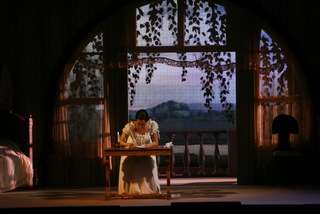|
Back
Stars of the White Nights Festival: Yevgeny Onegin Saint-Petersburg
Mariinsky Theatre
06/04/2009 - & 19 June*
P. I. Tchaikovsky: Yevgeny Onegin
Gelena Gaskarova (Tatiana), Alexander Gergalov (Onegin), Yevgeny Akimov (Lensky), Sergei Aleksashkin (Gremin), Svetlana Volkova (Mme Larina), Nadezhda Serdyuk (Olga), Elen Vitman (Filippevna), Andrei Popv (M. Triquet), Alexander Nikitin (A Captain, Zaretsky), Fyodor Uvarov (Shanty Man)
Mariinsky Theatre Chorus, Andrei Petrenko (Principal Chorus Master), Mariinsky Theatre Orchestra and Chorus, Pavel Smelkov (Conductor)
Yuri Temirkanov (Stage Director), Irkin Gabatov (Director), Igor Ivanov (Set Designer), Igor Suvorov (Technical Director)

G. Gaskarova (© N. Razina)
2009 marks the 17th Stars of the White Nights Festival which runs from May 21 to July 19. In 60 days there are 105 performances at either the Mariinsky Theatre or the Mariinsky Concert Hall. The program includes an astonishing 32 different operas (or programs of shorter operas), most of which are performed just once. Similarly, there are 20 ballets or ballet programs. The Mariinsky’s Artistic Director, Valery Gergiev, conducts 25 of the events.
Incidentally, the Mariinsky is far from the sole presenter of classical music in St. Petersburg, although its range of offerings is easily the most diverse. Opera and ballet are also presented at the historic Mikhailovsky Theatre (formerly called the Maly, and site of such premieres as Lady Macbeth of Mtsensk and Prokofiev’s War and Peace). It is currently run by Elena Obratsova. There is a third company, the St. Petersburg Opera, that performs in an ornate theatre in a former mansion not far from the Mariinisky. Yet more ballet is presented in at least two other venues. Furthermore, the St. Petersburg Philharmonic Orchestra (current conductor: Yuri Temirkanov) also has a June festival, with a full calendar of events. The full official name of its organization is the D. D. Shostakovitch St. Petersburg Academic Philharmonia; it presents concerts in its historic Grand Hall as well as a smaller venue, the Glinka Concert Hall. Concerts also occur in churches, ex-churches and other venues. A person so inclined could have seen Yevgeny Onegin at three different theatres in June, and Swan Lake at four. And if one is trying to see the main sights in the city at the same time, it’s a good thing that the sun shines 20 hours a day. (The nights are truly white, as advertised.) Like the locals, just don’t bother with sleep.
In some ways, the White Nights Festival is really an extension of the Mariinsky’s busy regular season, but beefed up with several galas (at gala prices) and premieres. Among the regular repertory presentations this year is Yevgeny Onegin in a production dating from 1984. We think of Yuri Temirkanov as a renowned conductor, but during his years (1977-88) as director of the then-Kirov (Mariinsky from 1992) he also made his mark as a director. Valery Gergiev (as quoted in The History of the Mariinsky Theatre 1783-2008) credits Temirkanov with rescuing the organization from a creeping provincialism and restoring “its fame and brilliance”, especially when his productions of Yevgeny Onegin and Pikavaya Dama were toured to London in 1987.
After 25 years of constant use, the production shows its age in a few places and has acquired a stolid air. But it is neither sleepy nor sloppy, with every “i” carefully dotted, every “t” carefully crossed. (In addition to Yuri Temirkanov, Irkin Gabitov is credited as director, and there are two assistant directors). The opening scene is right out of a nostalgic Russian genre painting of a house nestled in autumnal woods, and subsequent scenes are similarly evocative. Yevgeny Akimov as Lensky creates an electric moment with his impetuous entrance in Act I; the production could use more such dramatic points, especially in the use of the chorus, which is disappointingly oratorio-like at times.
Gelena Gaskarova (in her role debut on June 19) is a suitably winsome Tatiana, making the transition from bookish country mouse to sophisticated princess. She is a recent “graduate” (if that’s the right word) of the Mariinsky’s Academy of Young Singers (which is directed by Larisa Gergieva, Maestro Gergiev’s sister). Alexander Gergalov is a pale, aloof Onegin whose portrayal of the title character’s boredom is perhaps too thorough. It’s a welcome relief when he finally comes to life in the third act. The fourth principal, Sergei Aleksashkin, is outstanding both vocally and dramatically as Prince Gremin.
Outstanding also among the comprimario roles is Elena Vitman as Filippevna, Tatiana’s nurse.
The orchestra under Pavel Smelkov sounds - as one would expect - exceptionally rich and full, in fact overmatching singers on occasion (with the exception of Aleksashkin and Vitman).
Much to my surprise, there were surtitles in English, a friendly nod to the fact that St. Petersburg is mobbed with tourists during the white nights, although most of them seem to be Russian.
Another surprise, but less welcome, was the handling of curtain calls. Only four performers took bows: Tatiana, Onegin, Lensky and the conductor. We didn’t have a chance to applaud the wonderful Gremin, Filippevna, the chorus, etc.
In spite of a lack of dynamism due perhaps to an excessively reverential attitude toward the work and/or the production, it is a real treat to see this staple of the Russian repertory performed in what is undoubtedly one of the great theatres not only of Russia but of the world. One aspect of audience behaviour, however, severely reduced one’s enjoyment level: the constant use of the dreaded flash camera. Not a minute could pass without one or several flashes going off, and dramatic moments (e.g., the death of Lensky) were seriously compromised. The usual announcements about mobile phones, etc. were made before the performance (in Russian and English), but obviously to no avail.
Incidentally, an indication of the richness of the White Nights Festival: the same evening, at the Mariinsky Concert Hall, Maestro Gergiev was conducting the festival’s sole performance of Duke Bluebeard’s Castle.
Michael Johnson
|